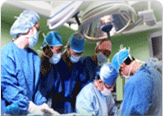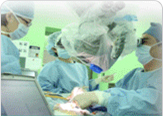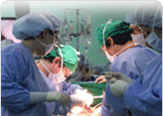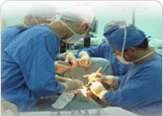Korean medical institutions offer a complete range of most advanced and most effective medical treatments. High quality medical services are offered through a large number of medical specialists, cutting-edge medical equipment and top quality facilities. Korean medical institutions draw from the combined strength of research, education and patient care to offer the best medical care to each and every patient.
With innovative and experienced approach to medicine, Korea is well-known around the world especially for certain medical specialties. These include: oncology, cardiovascular disease, plastic surgery, dentistry and Traditional Korean Medicine.
Korea has achieved great health outcomes and has consistently produced high levels of patient satisfaction with world-class medical practices. Korea is emerging as a leading country in medicine.
Medical Specialists
Korea has a large number of specialists. 70 percent or 66,821 doctors out of a total number of 95,088 doctors in Korea are specialists.
Areas of Expertise:
 Gastric Cancer Center
Gastric Cancer Center Artificial Cochlea Implant Center
Artificial Cochlea Implant Center Liver Transplantation Center
Liver Transplantation Center Breast Cancer Center
Breast Cancer Center
- Some specialties are recognized as top class all around the world.
Oncology, Cardiovascular Disease, Plastic Surgery, Dentistry, Traditional Korean Medicine, etc.
Medical Accomplishments
- Average life expectancy is 76.8 years for men, 83.8 years for women and 80.3 years combined for both genders (OECD's average=79.4 years combined for both genders) Infant mortality rate per 1000 live births is 3.5 (OECD's average=4.6)
- Five Year Survival Rate of Cancer Patients
(unit: %)
| Korea(2003-2007)* | USA(2001-2007)** | |
|---|---|---|
| Stomach | 63.1 | 26.3 |
| Liver | 23.3 | 14.4 |
| Cervix | 80.5 | 68.6 |
| Colon/Rectum | 70.1 | 64.3 |
- * The National Cancer Control Program
- ** The Surveillance, Epidemiology and End Results(SEER)
- Organ Transplantation
- Number of Organ Transplantation Cases in 2010
- Total cases: 3,137
- 1,749 Cases from Living Donors : Kidney, Liver, Pancreas, Bone-marrow
- 1,388 Cases from Brain Death Donor Cases (9 organs)
- Number of Organ Transplantation Cases in 2010
-
Donation from someone In brain death
Donor
transport- Medical Institution for organ transplantation
- KONOS(Korea Network for Organ Sharing)
- Specialized Managing Institution for the patients diagnosed as brain deathDispatch an organ extraction team
Organ transport
Source : Korea Network for Organ Sharing (2011)
- Overcoming the limitations of modern medicine through successful treatment of extremely low birth weight (ELBW) infants as defined by a birth weight of ≤380g
- Health screening, cosmetic surgery, spine and joint treatment comparable to that provided by advanced nations

